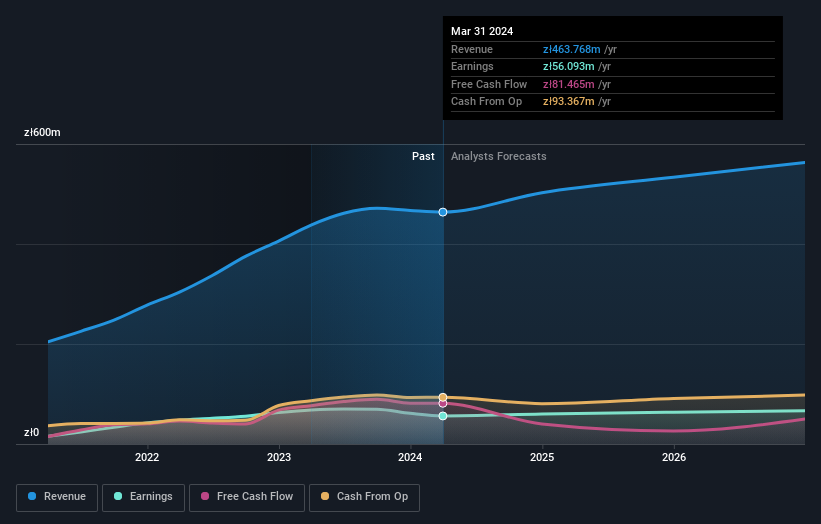- Poland
- /
- Specialty Stores
- /
- WSE:WTN
Wittchen S.A.'s (WSE:WTN) last week's 13% decline must have disappointed private companies who have a significant stake

Key Insights
- The considerable ownership by private companies in Wittchen indicates that they collectively have a greater say in management and business strategy
- The largest shareholder of the company is Simei Investments Ltd with a 56% stake
- Institutional ownership in Wittchen is 12%
Every investor in Wittchen S.A. (WSE:WTN) should be aware of the most powerful shareholder groups. And the group that holds the biggest piece of the pie are private companies with 56% ownership. Put another way, the group faces the maximum upside potential (or downside risk).
And following last week's 13% decline in share price, private companies suffered the most losses.
Let's delve deeper into each type of owner of Wittchen, beginning with the chart below.
View our latest analysis for Wittchen

What Does The Institutional Ownership Tell Us About Wittchen?
Institutional investors commonly compare their own returns to the returns of a commonly followed index. So they generally do consider buying larger companies that are included in the relevant benchmark index.
We can see that Wittchen does have institutional investors; and they hold a good portion of the company's stock. This can indicate that the company has a certain degree of credibility in the investment community. However, it is best to be wary of relying on the supposed validation that comes with institutional investors. They too, get it wrong sometimes. It is not uncommon to see a big share price drop if two large institutional investors try to sell out of a stock at the same time. So it is worth checking the past earnings trajectory of Wittchen, (below). Of course, keep in mind that there are other factors to consider, too.

We note that hedge funds don't have a meaningful investment in Wittchen. The company's largest shareholder is Simei Investments Ltd, with ownership of 56%. With such a huge stake in the ownership, we infer that they have significant control of the future of the company. Meanwhile, the second and third largest shareholders, hold 3.6% and 3.4%, of the shares outstanding, respectively. Monika Wittchen, who is the second-largest shareholder, also happens to hold the title of Vice Chairman of Management Board.
Researching institutional ownership is a good way to gauge and filter a stock's expected performance. The same can be achieved by studying analyst sentiments. While there is some analyst coverage, the company is probably not widely covered. So it could gain more attention, down the track.
Insider Ownership Of Wittchen
The definition of company insiders can be subjective and does vary between jurisdictions. Our data reflects individual insiders, capturing board members at the very least. Company management run the business, but the CEO will answer to the board, even if he or she is a member of it.
Most consider insider ownership a positive because it can indicate the board is well aligned with other shareholders. However, on some occasions too much power is concentrated within this group.
Our most recent data indicates that insiders own some shares in Wittchen S.A.. It has a market capitalization of just zł548m, and insiders have zł21m worth of shares, in their own names. Some would say this shows alignment of interests between shareholders and the board, though we generally prefer to see bigger insider holdings. But it might be worth checking if those insiders have been selling.
General Public Ownership
With a 28% ownership, the general public, mostly comprising of individual investors, have some degree of sway over Wittchen. While this group can't necessarily call the shots, it can certainly have a real influence on how the company is run.
Private Company Ownership
Our data indicates that Private Companies hold 56%, of the company's shares. Private companies may be related parties. Sometimes insiders have an interest in a public company through a holding in a private company, rather than in their own capacity as an individual. While it's hard to draw any broad stroke conclusions, it is worth noting as an area for further research.
Next Steps:
It's always worth thinking about the different groups who own shares in a company. But to understand Wittchen better, we need to consider many other factors. To that end, you should be aware of the 1 warning sign we've spotted with Wittchen .
Ultimately the future is most important. You can access this free report on analyst forecasts for the company.
NB: Figures in this article are calculated using data from the last twelve months, which refer to the 12-month period ending on the last date of the month the financial statement is dated. This may not be consistent with full year annual report figures.
Valuation is complex, but we're here to simplify it.
Discover if Wittchen might be undervalued or overvalued with our detailed analysis, featuring fair value estimates, potential risks, dividends, insider trades, and its financial condition.
Access Free AnalysisHave feedback on this article? Concerned about the content? Get in touch with us directly. Alternatively, email editorial-team (at) simplywallst.com.
This article by Simply Wall St is general in nature. We provide commentary based on historical data and analyst forecasts only using an unbiased methodology and our articles are not intended to be financial advice. It does not constitute a recommendation to buy or sell any stock, and does not take account of your objectives, or your financial situation. We aim to bring you long-term focused analysis driven by fundamental data. Note that our analysis may not factor in the latest price-sensitive company announcements or qualitative material. Simply Wall St has no position in any stocks mentioned.
Have feedback on this article? Concerned about the content? Get in touch with us directly. Alternatively, email editorial-team@simplywallst.com
About WSE:WTN
Wittchen
Manufactures and sells leather goods for men and women in Poland and Europe.
Excellent balance sheet low.
Market Insights
Community Narratives


